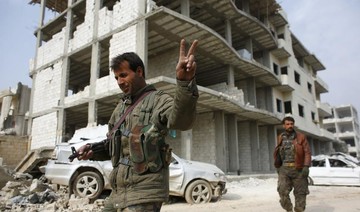ISTANBUL: A Turkish court on Thursday sentenced the former head of a pro-Kurdish party to 42 years in prison for his alleged role in deadly 2014 protests that erupted as Daesh group jihadists overran the Syrian town of Kobani.
In jail since 2016, Selahattin Demirtas, 51, a two-time election rival to President Recep Tayyip Erdogan, was convicted of dozens of crimes including undermining state unity and the country’s integrity.
The court in Sincan, on the outskirts of Ankara, also sentenced the People’s Democratic Party (HDP) former co-chair Figen Yuksekdag to 30 years and three months in jail, private broadcaster NTV and rights group MLSA reported.
After the hearing, several lawmakers for the party, which has since been renamed the DEM, held up portraits of the two jailed leaders in the national assembly.
Fearing troubles after the case, the governors of at least 14 southern provinces with large Kurdish and Syrian communities banned demonstrations for four days, MLSA added.
The court ordered the release of some politicians, including Gultan Kisanak, former mayor of the major pro-Kurdish city of Diyarbakir, but many others were handed jail terms.
The case against former HDP members, including Demirtas and Yuksekdag, stems from a dark episode of the more than decade-long Syria war.
Thirty-seven people died in demonstrations against the Turkish army’s inaction in the face of an IS offensive against the largely Kurdish northern Syrian town.
The fighting was visible from the Turkish side of the border and many in the Kurdish community viewed the army as complicit in the humanitarian disaster that followed.
The jihadists were driven out of Kobani in January 2015 by US-backed Syrian Kurdish fighters that Turkiye officially views as terrorists.
Turkiye views the HDP as the political front of outlawed Kurdish militants who have been waging an insurgency that has claimed tens of thousands of lives since 1984.
The HDP blamed Turkish police for causing the deaths.
In 2023 testimony, Demirtas slammed the case against him. “There’s no single evidence about me. This is a case of political revenge, we were not legally arrested, we are all political hostages.”
Demirtas has been in jail in the western city of Edirne since 2016, facing multiple trials on terror-related charges that Western governments view as part of Erdogan’s crackdown on political dissent.
The European Court of Human Rights has repeatedly called for his release.
The court verdict against former leaders and members of the HDP — which faces a court case that could result in it being shut down — sparked protests.
DEM Party co-chair Tuncer Bakirhan slammed the verdict as a “black stain in the history of Turkish justice.”
“We all witnessed a legal massacre here today,” Bakirhan said.
“Kurds and revolutionaries were tried to be erased from the political scene,” he added.
Prosecutors accused the 108 defendants of “attacking the integrity of the state,” and of crimes including looting and murder.
They sought an aggravated life sentence for 36 suspects including Demirtas on charges of attacking state unity and the country’s integrity.
Human Rights Watch called the conviction of Demirtas and other leading Kurdish politicians the latest move in a campaign of persecution that has disenfranchised mainly Kurdish voters.
“Using bogus criminal proceedings to remove democratically elected Kurdish politicians from political life will do nothing to end the Turkish state’s decades-long conflict with the PKK,” said Hugh Williamson, Europe and Central Asia director at Human Rights Watch.
Defense lawyers said they would appeal the verdict, which came after Erdogan spoke of a “softening” in politics, after his Islamic-rooted party suffered a historic defeat in the March 31 local elections.
“The politics in Turkiye needs softening. We will do our part as before,” he said in an address on Wednesday.
The issue of political prisoners, including leading civil society leader Osman Kavala, reportedly came up during Erdogan’s rare meeting on May 2 with opposition CHP leader Ozgur Ozel. The CHP retained control of large cities including Istanbul and made major gains in the March vote.
On Wednesday, an Istanbul court rejected a request for Kavala to be retried.
The Paris-born philanthropist was arrested in October 2017 and sentenced to life imprisonment in 2022 for allegedly trying to topple Erdogan’s government.
Turkiye court jails Kurdish leader for 42 years over 2014 unrest
https://arab.news/v3rkt
Turkiye court jails Kurdish leader for 42 years over 2014 unrest

- HDP former co-chair Figen Yuksekdag was sentenced to more than 30 years in prison


























